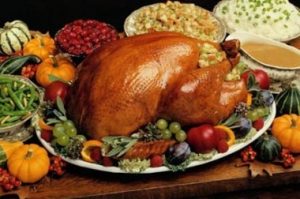With COVID-19 concerns, the holidays will look a little different this year. One part of the holidays that remains the same is the need for food safety. Check out the following information and resources for planning your holiday meals.
 Health Precautions, from Dr. Barbara Ingham, University of Wisconsin Professor of Food Science and Division of Extension Food Safety Specialist:
Health Precautions, from Dr. Barbara Ingham, University of Wisconsin Professor of Food Science and Division of Extension Food Safety Specialist:
- Cloth face coverings are important!
- Practice physical distancing inside and outside.
- Hand washing is an effective part of your food safety and health plan.
- Shared meals should be approached with caution.
- There is no evidence that the coronavirus is transmitted through food.
 USDA’s Countdown to the Thanksgiving Holiday:
USDA’s Countdown to the Thanksgiving Holiday:
As Thanksgiving approaches, cooking the traditional turkey dinner gives rise to anxieties and questions. What kind of turkey should I buy? Should I buy a frozen turkey or a fresh one? How do I store my turkey?
A few simple steps will not only ease your holiday fears, but will ensure a delicious and a safe meal for you, your family, and your friends. The following information may help you prepare your special Thanksgiving meal and help you countdown to the holiday:
- Plan Ahead
- Fresh or Frozen
- Thawing – In the refrigerator
- Thawing – In cold water
- Thawing – In the microwave
- Preparation – The day before Thanksgiving
- Preparation – Thanksgiving Day
- Timetables for Turkey Roasting
- Use a food thermometer to check the internal temperature of the turkey
- Storing Leftovers
Plan Ahead
Plan your menu several weeks before the holiday. Shopping early will ease the countdown tension for your Thanksgiving meal. Ask these questions to help plan your meal. Do you want a fresh or frozen turkey? Do you have enough space to store a frozen bird if purchased in advance; if not, when should you purchase a turkey? What size bird do you need to buy?
Fresh or Frozen
If you choose to buy a frozen bird you may do so at any time, but make sure you have adequate storage space in your freezer. If you buy a fresh turkey, be sure you purchase it only 1-2 days before cooking. Do not buy a pre-stuffed fresh turkey. Use the following chart as a helpful guide:
| What Size Turkey to Purchase | |
|---|---|
| Type of Turkey | Pounds to Buy |
| Whole bird | 1 pound per person |
| Boneless breast of turkey | 1/2 pound per person |
| Breast of turkey | 3/4 pound per person |
| Prestuffed frozen turkey | 1 1/4 pounds per person – keep frozen until ready to cook |
Thawing
Place frozen bird in original wrapper in the refrigerator (40 °F or below). Allow approximately 24 hours per 4 to 5 pounds of turkey. A thawed turkey can remain in the refrigerator for 1-2 days.
| Thawing Time in the Refrigerator | |
|---|---|
| Size of Turkey | Number of Days |
| 4 to 12 pounds | 1 to 3 days |
| 12 to 16 pounds | 3 to 4 days |
| 16 to 20 pounds | 4 to 5 days |
| 20 to 24 pounds | 5 to 6 days |
If you forget to thaw the turkey or don’t have room in the refrigerator for thawing, don’t panic. You can submerge the turkey in cold water and change the water every 30 minutes. Allow about 30 minutes defrosting time per pound of turkey. The following times are suggested for thawing turkey in water. Cook immediately after thawing.
| Thawing Time in Cold Water | |
|---|---|
| Size of Turkey | Hours to Defrost |
| 4 to 12 pounds | 2 to 6 hours |
| 12 to 16 pounds | 6 to 8 hours |
| 16 to 20 pounds | 8 to 10 hours |
| 20 to 24 pounds | 10 to 12 hours |
Microwave thawing is safe if the turkey is not too large. Check the manufacturer’s instructions for the size turkey that will fit into your oven, the minutes per pound, and the power level to use for thawing. Cook immediately after thawing.
Preparation
The day before Thanksgiving
Make sure you have all the ingredients you need to prepare your holiday meal. Check to make sure you have all the equipment you will need, including a roasting pan large enough to hold your turkey and a food thermometer. Wet and dry stuffing ingredients can be prepared ahead of time and refrigerated separately. This may also be done on Thanksgiving Day. Mix ingredients just before placing the stuffing inside the turkey cavity or into a casserole dish.
Thanksgiving Day
If you choose to stuff your turkey, stuff loosely. The stuffing should be moist, not dry, since heat destroys bacteria more rapidly in a moist environment. Place stuffed turkey in oven immediately. You may also cook the stuffing outside the bird in a casserole. Judging cooking time for your turkey will be easier if the following chart is used. The times listed are for a fresh or thawed turkey in an oven at 325 °F. These times are approximate.
Timetables for Turkey Roasting
(325 °F oven temperature)
| Cooking Time — Unstuffed | |
|---|---|
| Size of Turkey | Hours to Prepare |
| 8 to 12 pounds | 2 3/4 to 3 hours |
| 12 to 14 pounds | 3 to 3 3/4 hours |
| 14 to 18 pounds | 3 3/4 to 4 1/4 hours |
| 18 to 20 pounds | 4 1/4 to 4 1/2 hours |
| 20 to 24 pounds | 4 1/2 to 5 hours |
| Cooking Time — Stuffed | |
|---|---|
| Size of Turkey | Hours to Prepare |
| 8 to 12 pounds | 3 to 3 1/2 hours |
| 12 to 14 pounds | 3 1/2 to 4 hours |
| 14 to 18 pounds | 4 to 4 1/4 hours |
| 18 to 20 pounds | 4 1/4 to 4 3/4 hours |
| 20 to 24 pounds | 4 3/4 to 5 1/4 hours |
Use a food thermometer to check the internal temperature of the turkey.
A whole turkey is safe cooked to a minimum internal temperature of 165 °F throughout the bird. Check the internal temperature in the innermost part of the thigh and wing and the thickest part of the breast. All turkey meat, including any that remains pink, is safe to eat as soon as all parts reach at least 165 °F. The stuffing should reach 165 °F, whether cooked inside the bird or in a separate dish. When turkey is removed from the oven, let it stand 20 minutes. Remove stuffing, and carve turkey.
Storing Leftovers
Cut the turkey into small pieces; refrigerate stuffing and turkey separately in shallow containers within 2 hours of cooking. Use leftover turkey and stuffing within 3-4 days or freeze these foods. Reheat thoroughly to a temperature of 165 °F or until hot and steaming.